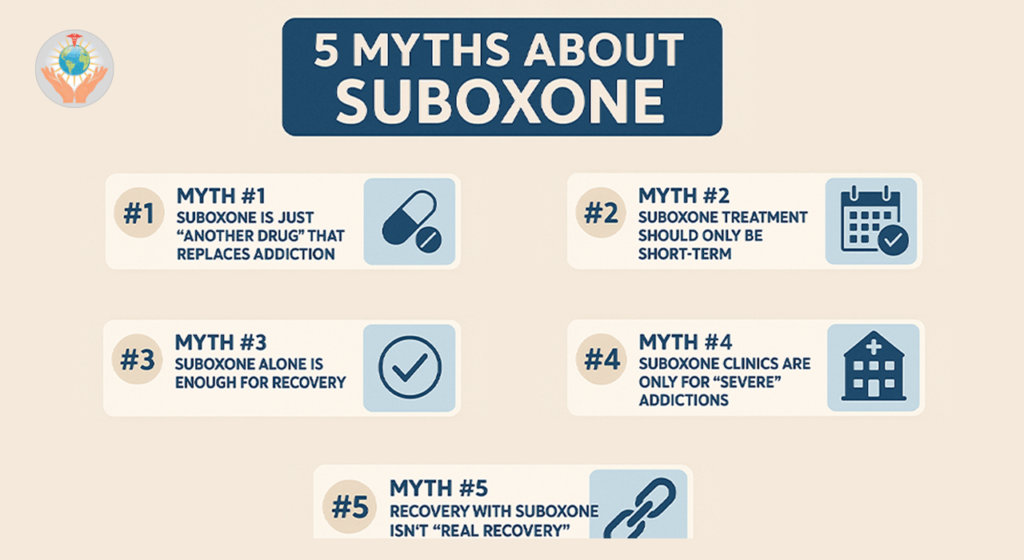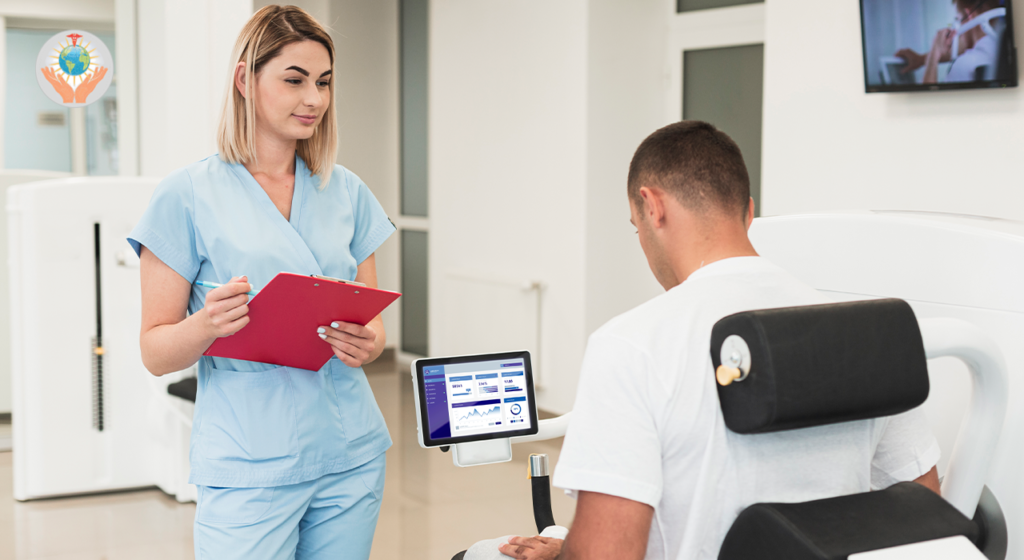Opioid addiction has become one of the most pressing public health crises in the United States, and Indiana is no exception.
Families, communities, and healthcare systems continue to feel the devastating effects of opioid misuse. Fortunately, proven treatments exist, and Suboxone is one of the most effective.
Despite its success, Suboxone treatment is often surrounded by myths and misconceptions.
These myths can prevent people from seeking help at a Suboxone clinic, discourage family members from supporting loved ones, and create unnecessary stigma around recovery.
In this article, we’ll break down five common Suboxone myths, explain the truth behind them, and highlight how Suboxone doctors and opioid addiction treatment outpatient clinics are changing lives every day.

Myth #1: Suboxone is Just “Another Drug” That Replaces Addiction
One of the most common misunderstandings is the idea that Suboxone simply replaces one addiction with another.
This myth has kept countless people from getting the help they desperately need.
The truth:
Suboxone is not a “replacement drug.” It is a carefully designed medication that contains buprenorphine (a partial opioid agonist) and naloxone (an opioid antagonist).
This combination helps reduce cravings and withdrawal symptoms while blocking the euphoric effects of stronger opioids like heroin, fentanyl, or oxycodone.
When taken as prescribed under medical supervision, Suboxone stabilizes the brain’s chemistry, allowing patients to focus on recovery, counseling, and rebuilding their lives.
This is why Suboxone doctors across Indiana emphasize that medication-assisted treatment (MAT) is not about replacing addiction, it’s about creating a stable foundation for long-term recovery.

Myth #2: Suboxone Treatment Should Only Be Short-Term
Some people believe Suboxone should only be used for a few weeks or months, and then patients should “taper off.”
While this might sound ideal in theory, it does not reflect the reality of how opioid addiction works.
The truth:
Opioid addiction is a chronic, relapsing condition that alters brain chemistry. For many people, long-term or even indefinite treatment may be necessary.
Just like a person with diabetes requires ongoing insulin, many patients need continued support with Suboxone.
At a Suboxone clinic, treatment plans are always individualized. Some patients may benefit from short-term use, while others require maintenance therapy for years.
Both approaches are valid, as long as they help patients remain stable, avoid relapse, and improve quality of life.
The real goal isn’t to rush people off Suboxone but to help them achieve lasting recovery through safe, evidence-based care.

Myth #3: Suboxone Alone is Enough for Recovery
While Suboxone is highly effective in reducing withdrawal and cravings, another common myth is that the medication alone will “cure” opioid addiction.
The truth:
Medication is only one part of recovery. Addiction affects not just the brain, but also emotions, behaviors, and social interactions.
For this reason, opioid addiction treatment outpatient clinics in Indiana emphasize a holistic approach.
A complete treatment plan usually includes:
- Counseling and behavioral therapy to address the root causes of addiction
- Support groups like NA, SMART Recovery, or peer support programs
- Lifestyle changes including nutrition, exercise, and stress management
- Family support and education to create a strong recovery environment
Suboxone works best when combined with these additional supports. That’s why Suboxone doctors collaborate closely with substance abuse counselors and therapists to create comprehensive treatment plans.

Myth #4: Suboxone Clinics Are Only for “Severe” Addictions
Another harmful misconception is that you must be at “rock bottom” to qualify for treatment at a Suboxone clinic.
The truth:
Anyone struggling with opioid misuse, whether it’s prescription painkillers or illicit opioids, can benefit from professional treatment.
Suboxone is not reserved for the most severe cases.
In fact, early intervention often leads to better outcomes. Many outpatient clinics in Indiana encourage patients to seek help as soon as they notice warning signs such as:
- Needing higher doses of opioids to feel the same effect
- Using opioids despite negative consequences
- Cravings or withdrawal symptoms when trying to cut back
- Spending more time and energy obtaining or using opioids
A Suboxone clinic provides a safe, judgment-free space to start recovery, no matter how “mild” or “severe” the addiction may seem.
Myth #5: Recovery With Suboxone Isn’t “Real Recovery”
Sadly, stigma often paints people on Suboxone as not being “truly sober.” This idea creates shame and discourages people from pursuing treatment.
The truth:
Recovery is not about meeting someone else’s definition of sobriety. It’s about reclaiming your life, restoring health, rebuilding relationships, and achieving stability.
Research shows that people who use Suboxone as part of a comprehensive treatment plan are far more likely to stay in recovery, avoid relapse, and rebuild their lives than those who attempt to quit opioids “cold turkey.”
Many Suboxone doctors emphasize that taking medication for a chronic condition is no different from using blood pressure medication or insulin, it’s healthcare, not weakness.
Suboxone is a proven, life-saving tool that gives people the chance to heal and thrive.
Why Suboxone Clinics Matter in Indiana, United States
Indiana continues to battle rising opioid overdose deaths, with fentanyl playing a devastating role. Suboxone clinics are stepping up as crucial allies in this fight.
A Suboxone clinic in Indiana often provides:
- Same-day appointments for urgent cases
- Confidential, outpatient-based care
- Licensed Suboxone doctors who are trained in addiction medicine
- Affordable options including Medicaid, Medicare, and private insurance
- Comprehensive recovery programs including counseling, therapy, and relapse prevention
By making treatment accessible and stigma-free, these clinics help reduce overdoses, support families, and strengthen communities.

Final Thoughts
Opioid addiction is a complex and deeply personal struggle, but treatment works, and recovery is possible.
The myths surrounding Suboxone can create fear and hesitation, but the reality is clear: International Family Medicine Suboxone clinics, and outpatient opioid addiction treatment centers are saving lives every single day.
If you or a loved one in Indiana is struggling, know that help is available. Suboxone treatment is not about replacing one drug with another, but about creating stability, reducing cravings, and building the foundation for long-term recovery.
Don’t let myths stand in the way of healing. Reach out to a trusted Suboxone clinic today and take the first step toward reclaiming your life.

